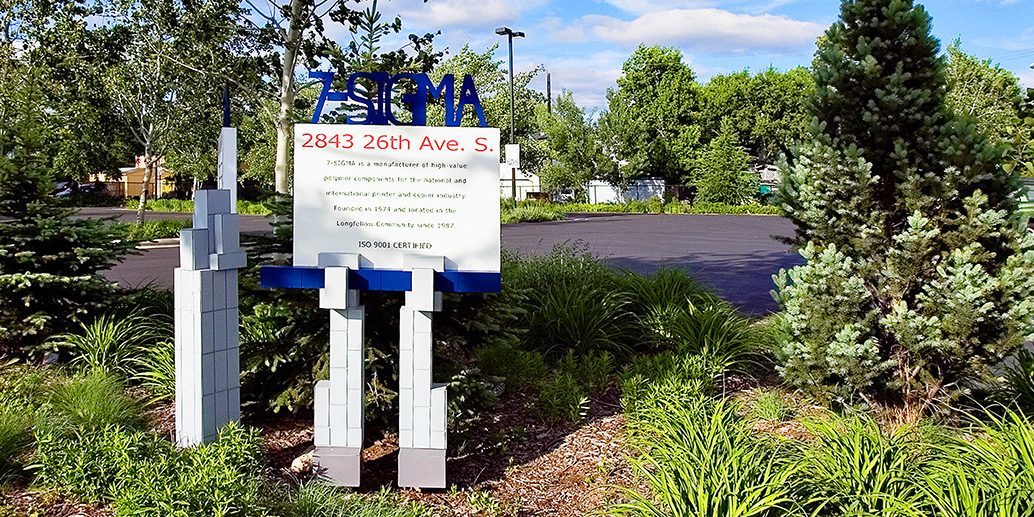7-SIGMA Rainwater Gardens & MPLS Blooms Awards Remarks
The history of 7-SIGMA in the Longfellow neighborhood goes back over 40 years. In 1973 Jerzy and Jutta Wyrobek and their sons opened the doors of a new family business in a neighborhood machine shop located at 42nd Street and Dwight Avenue. In 1979 the business was moved to a location at 36th Avenue South. Then, in 1987, with funds provided by the Minneapolis Community Development Agency, 7-SIGMA moved to its present location on 26th Avenue South. It has taken the company 18 years to reclaim and renovate the 7-SIGMA building and site. Of interest is the fact that the 7-SIGMA building is the last remaining structure of the Minneapolis-Moline Power Implement Company. The facility’s most recent improvements were again funded through low-interest funds provided by MCDA, now known as Minneapolis Community Planning and Economic Development, or CPED.
7-SIGMA is an engineering-oriented manufacturer of high value polymer components. The new shipping and receiving apron and the employee parking lot were necessary improvements to streamline the receipt and delivery of material and product from the facility, and to provide safe access to and from the building for 7-SIGMA employees. It has taken 10 years to assemble the parcels necessary to accommodate the square footage needed to facilitate these improvements. The redevelopment process also involved moving a duplex from 26th Avenue South to 27th Avenue South to accomplish the company and neighborhood goal of maintaining viable housing while growing higher paying jobs in our neighborhood. 7-SIGMA proudly considers itself to be a long-term Longfellow neighbor.
We are all aware of the changes to our environment in recent years caused by pollution discharge. Stormwater discharge is a leading contributor to the pollution of our local lakes and rivers. Technologies have now been designed and developed to direct stormwater to infiltration locations that are designed to percolate run-off directly into the soil. Subsequently, the stormwater with its accompanying pollution being filtered by plant root systems located in engineered collection ponds, travels to natural groundwater sources. This technique is known as rainwater harvesting, and the landscaped areas that serve to collect and filter stormwater are known as rainwater gardens. Fred Rozumalski and Kurt Leuthold of Barr Engineering are pioneers in the design and installation of rainwater gardens located in commercial and industrial applications. Working with Larson Engineering of Minnesota who designed and engineered the paved surfaces of the parking lot and delivery apron, Fred and Kurt located, designed and engineered the stormwater swales to collect 50% of 7-SIGMA’s site run-off. Phillips Garden supervised the installation of the plant materials from the plan designed by Fred Rozumalski. Now completed, our gardens manage approximately 90% of the polluted stormwater run-off from our paved areas, preventing the majority of this polluted water from traveling to the Mississippi River. This project was undertaken as part of 7-SIGMA’s ongoing commitment to environmental sustainability in the workplace.
Our partnership with the Longfellow Community Council and the Longfellow Business Association began in November of 2000 with joint service on the Steering Committee for the East End Revival Plan. The partnership was instituted to facilitate 7-SIGMA’s long-term plan to remain and grow in the Longfellow neighborhood and to address LCC’s concern that manufacturing growth align with long-range neighborhood development plans. Sustainable development has been the keystone of this joint venture. As a result of this community-business association, 7-SIGMA is viewed by the Longfellow community as an asset and resource, and is afforded a significant voice in the development plans for its immediate neighborhood. In turn, 7-SIGMA is committed to innovative sustainable community design practices that may serve as a model for manufacturing facilities co-existing adjacent to quality residential neighborhoods. The goal of this unique partnership is to keep good jobs close to home and to maintain a high standard for community livability.




